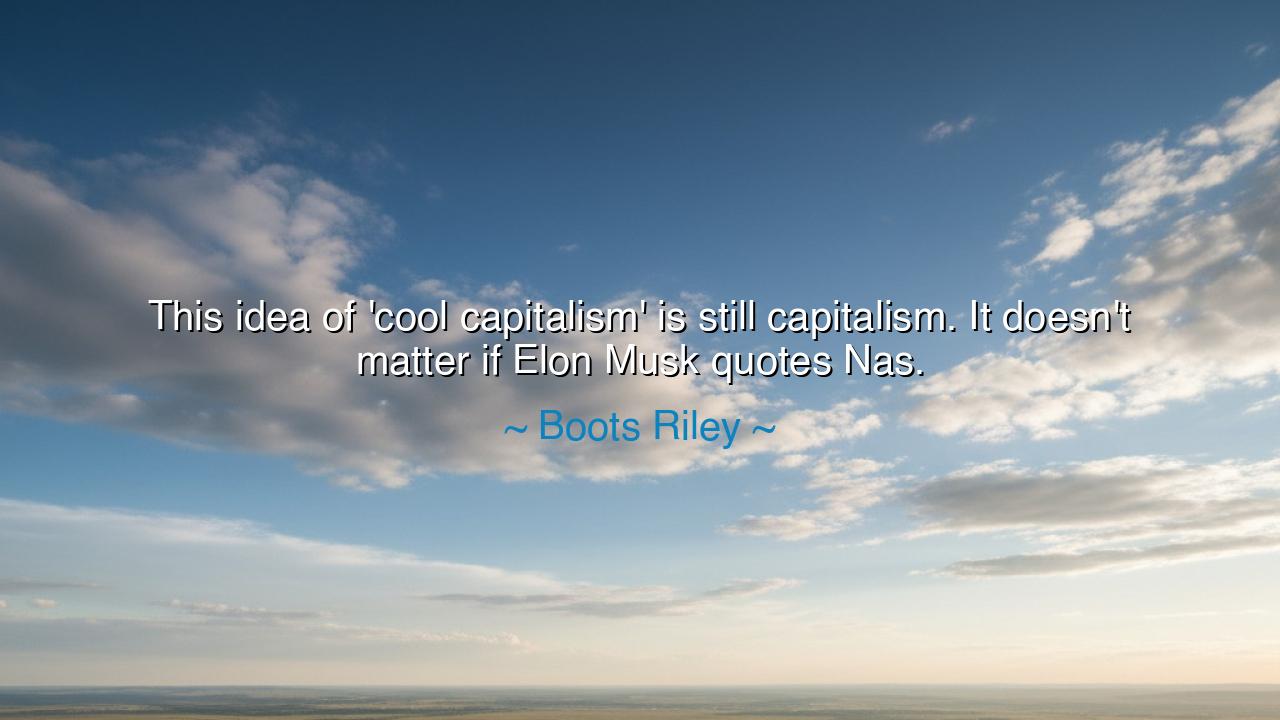
This idea of 'cool capitalism' is still capitalism. It doesn't
This idea of 'cool capitalism' is still capitalism. It doesn't matter if Elon Musk quotes Nas.






“This idea of 'cool capitalism' is still capitalism. It doesn't matter if Elon Musk quotes Nas.” In these words, Boots Riley unveils a truth that is both timeless and urgent: no matter how much capitalism is dressed in new clothes, no matter how many of its leading figures adopt alternative or rebellious personas, the essence of capitalism remains the same. It is a system designed to concentrate wealth and power in the hands of a few, regardless of the façades that are put on display. The notion of "cool capitalism"—where influential figures in business embrace the rhetoric of rebellion, often by adopting countercultural symbols—attempts to trick us into believing that the system itself is undergoing transformation, that it has somehow evolved into something more just or relatable. But as Riley sharply observes, it’s all still capitalism.
History is replete with examples of those who have tried to dress up the harshness of social systems with the veneer of progressiveness. Take, for instance, the reign of the Roman Emperor Nero. Though he famously portrayed himself as an artist and a man of the people, indulging in music and theater, his reign was marked by corruption, tyranny, and the ruthless consolidation of imperial power. He was a master of spectacle, a ruler who knew how to manipulate public opinion while continuing to build his empire on the suffering of others. In the same way, modern-day figures who embrace a “cool” image—like Elon Musk, who quotes artists such as Nas—may seek to blend rebellion with corporate influence, but the fundamental machinery of capitalism remains unchanged. The wealth and power they amass still perpetuate the systems of inequality and exploitation that have defined this era.
In the ancient world, those who sought to protect the status quo often cloaked their self-interest in the garb of progress. Plato, in his Republic, warned against the corruption of rulers who would employ false ideologies to maintain their control over the masses. Similarly, Boots Riley’s words are a modern warning against the seductive idea that the superficial adoption of progressive symbols or ideas can reform an inherently flawed system. This illusion is dangerous because it distracts us from the core of the matter: capitalism, as a system of economic organization, thrives on inequality and the exploitation of the many for the benefit of the few. Quoting Nas, or adopting any other cultural symbol of rebellion, does not change this fundamental truth.
Consider the example of Henry Ford, the automotive magnate who introduced the assembly line and revolutionized mass production. Ford was celebrated as a genius, hailed for making cars affordable to the average person. But he also used his power to maintain control over workers, paying them just enough to keep them working, while reaping immense profits. His innovations, while revolutionary, were ultimately in service of a capitalist system that concentrated wealth and power at the top, all while presenting the idea of progress to the masses. Ford was an early example of what Riley critiques today: the myth that corporate progress and capitalism are compatible with the needs of the working class.
The lesson that Boots Riley imparts is critical for us to understand in the present day. True transformation is not found in the superficial adoption of cool or rebellious symbols. If we are to truly challenge the injustices that arise from capitalism, we must look beyond the façades and question the very foundation of the system itself. No amount of cultural appropriation, no matter how hip or rebellious the message seems, can change the essential nature of capitalism, which is built on the exploitation of labor, the concentration of wealth, and the perpetuation of inequality.
We must recognize that “cool capitalism” is a distraction, a mask that conceals the reality of a system that favors the wealthy and powerful. The lesson here is not just about identifying the superficial gestures of rebellion in popular culture, but about taking action that goes beyond surface-level critiques. We must actively work to dismantle systems of exploitation and build a society that values people over profit, equity over wealth, and cooperation over competition. The true rebellion lies not in quoting Nas or dressing in alternative clothes, but in changing the very system that shapes our lives.
Let us take this lesson to heart. Real change is not about image—it is about substance. It is about challenging the structures of power that allow some to thrive at the expense of others. By embracing the truth, we can begin to build a world that is truly just, where wealth is not hoarded but shared, where power is distributed, and where the coolness of rebellion is not a marketing tool, but a genuine force for change.






AAdministratorAdministrator
Welcome, honored guests. Please leave a comment, we will respond soon